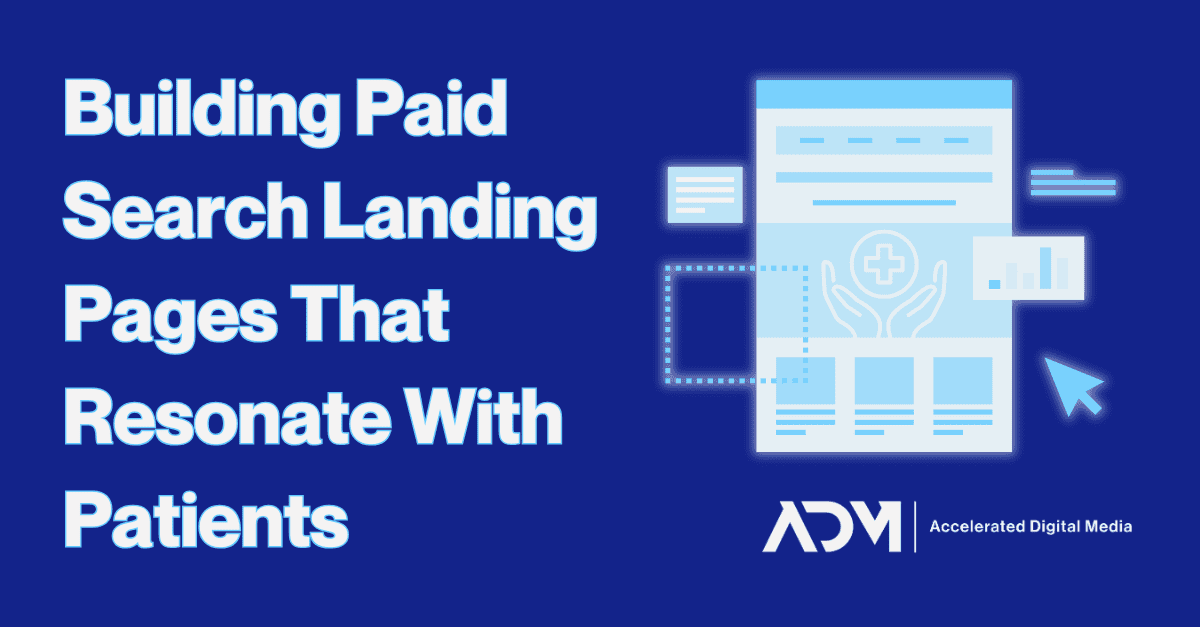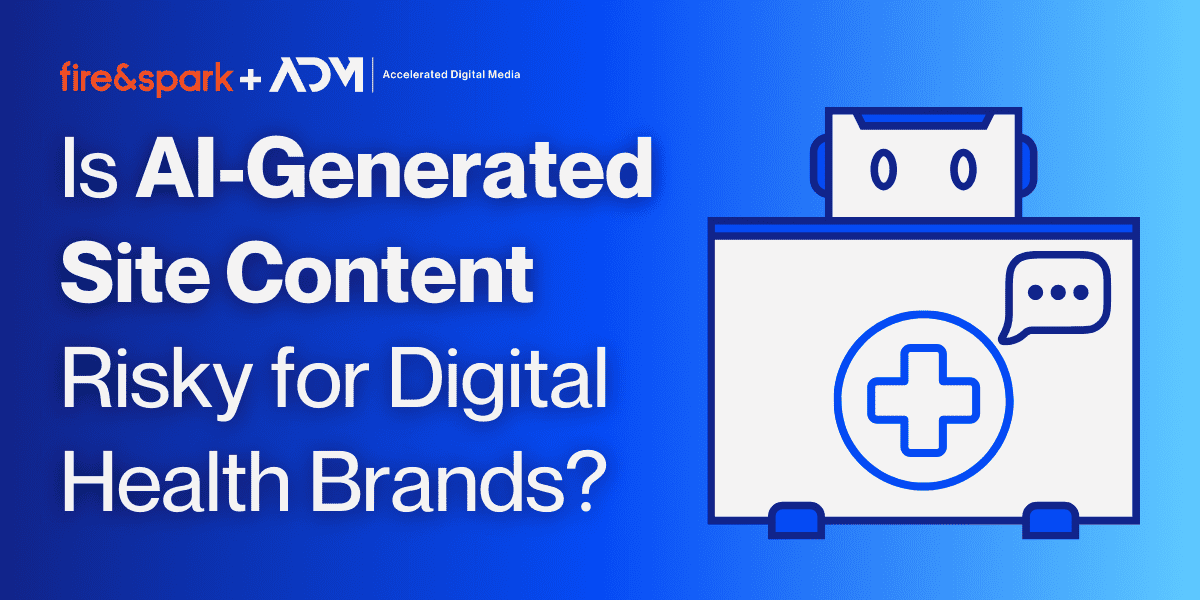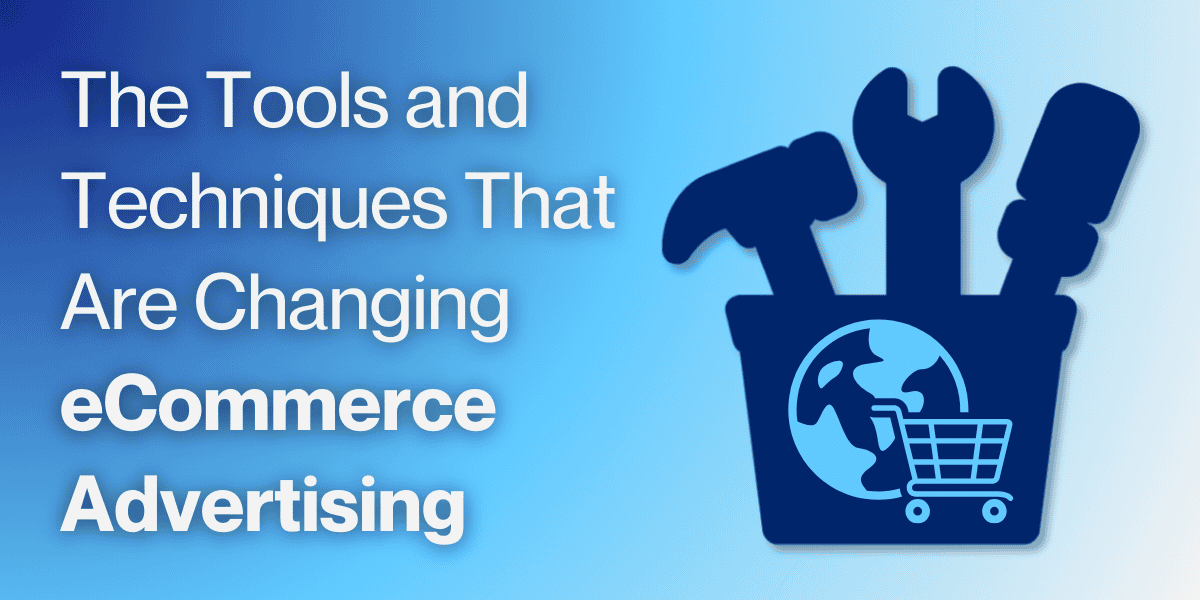In health marketing, your ability to turn impressions and engagement into conversions will always depend on the quality of your landing pages. For healthcare advertisers, pages are most likely going to have one of three goals:
- Driving appointments (whether in-person or online)
- Driving purchases (sometimes requiring a prescription)
- Driving clinical trial signups
Achieving any of those means you have successfully
- Brought relevant users to your site through your paid search ads
- Validated that they are your intended audience through the content on the page
- Made it both compelling and simple for them to take action.
As with landing pages from any industry, the most obvious problems for health advertisers will be failures at one or more of those checkpoints, which will prevent them from achieving their marketing goals.
Beyond just profit and loss statements of those participating, it’s important to remember that there are real people’s lives potentially being impacted with each interaction. Lack of clear and helpful information, or incorrect/outdated information, truly poor pages can diminish brand trust or provider reputation—preventing patients from obtaining care that they need
Landing Page Language Must Align Closely with Campaign Keywords
Landing pages must reflect the keywords that brought users to them, for a number of reasons. Obviously, users need to know they’re in the right place and getting the information they expect to see. But Google also uses them to determine the quality and relevance of your ad to ensure the ad appears at all.
For health brands, this can be particularly important because of the number of terms surrounding healthcare—if you’re bidding on a term that a patient is more likely to use to describe a symptom, you should also be using that term prominently on the landing page, rather than reverting entirely to formal/clinical terminology.
Health brands should regularly review search term reports to make sure that their keywords, ad groups, and landing pages are all aligned in their messaging to what searchers are currently looking to discover. Based on key themes or search intentions, an advertiser might segment these different keyword clusters into their own campaigns or ad groups, with each ad group receiving its own specifically-tailored landing page.
For example, an advertiser that offers dermatology products might break out keywords related to “skin care products” into a separate ad group from keywords relating to “natural skin care treatments.” Because the searcher has a much more specific intent in the “natural” query, the ad copy should very clearly set the expectation for what the searcher will see on the corresponding landing page.
Landing Page Copy Must be Compliant, Too
When deploying ad copy for paid search ads, health brands need to be sure they are staying within Google Ads’ guidelines. These boil down to: Avoid unfounded claims, bad information, or result guarantees.
But those Google Ads policies also apply to landing pages, as per Google policy—and health landing pages are also subject to FDA and/or FTC regulations. For instance, if a dietary supplement company wants to make a direct claim about a specific product or ingredient, its efficacy, or even a general health statement, they can be subject to penalties from the FTC if the data is not supported by a reputable source.
Healthcare advertisers must remain mindful about the claims they make and language they use on their landing page, these pages should at least be able to serve as inspiration for the generation of ad copy you pair with them. In the limited space of a Google Search ad, it can be tricky or impossible to accurately explain or source medical information—but a landing page affords that ability. Rather than flaunting Google’s rules to try to make a defensible claim, an advertiser may suggest or introduce a point at a high-level in ad copy (in a Google-compliant way), and allow the landing page to provide a deeper level of detail.
What Effective Healthcare Landing Pages Tell Patients
Compliance and relevance are paramount, but the purpose of a landing page is ultimately to inform. In addition to all of the relevant product or service information you’re providing, you should give users a complete understanding of how they can become patients by making sure key information is not left out.
Location-based Healthcare
For any location-based healthcare business, like in-person clinics and hospitals, it’s important to be exceedingly clear about what to expect on the premises during the first visit. Traditional information like hours and location are obvious, but additional factors like documents to bring, mask or temperature check requirements, limited capacity of waiting rooms, or any other relevant factors should always be disclosed upfront online.
Telehealth/Teletherapy
Remote health businesses that require an intake conversation should provide full detail of when and how that conversation may be scheduled, how long the conversation might take, information that the prospective patient should have on hand, and any technical requirements that might be necessary ensure the success of those calls.
Online Pharmacies and Non-prescription Medical Productss
For businesses that offer prescriptions, any potentially limiting factors such as age, complicating factors/contraindications, location (ie: where the pharmacy is cleared to operate), should also be clearly disclosed on the landing page.
For product-based businesses, the approach will be similar to pharmaceutical sellers with regard to disclosing eligibility up front. However, since there’s no requirement for the user to obtain a prescription, there must be some other sort of verification process for someone to purchase their desired product(s). Those verification requirements should be disclosed on the landing page. For example, some states prohibit the sale of specific drugs like pseudoephedrine to anyone under 18. The landing page needs to be very clear about any and all points a prospective patient/customer must provide to complete the checkout experience.
A/B Testing Your Landing Pages
At ADM, we’re obsessed with testing, and that applies to our clients’ landing pages just as much as it does our ads. We think it’s essential for healthcare advertisers to use their landing pages to learn what resonates best with their audiences. Effective tests might explore:
- Information Sufficiency: Test whether users have enough details about the product/treatment and the appointment or checkout process.
- Service Structure: Experiment with messaging about ongoing versus one-time treatments, as well as subscription versus one-time purchases.
- Disqualifying Attributes: Clearly state eligibility criteria to manage user expectations and prevent frustration.
- Competitor Differentiation: Identify and test the most effective ways to highlight unique brand or provider benefits.
- Social Proof: Where appropriate, consider testing testimonials or reviews to see if they enhance trust.
- Order of Information: Find out whether conversion rates change depending on when different aspects of your health service are introduced first on the page.
Landing Pages are One Piece of the Health Marketing Puzzle
Creating effective landing pages in healthcare marketing is about more than just conversions—it’s about building trust, maintaining transparency, and equipping potential patients with the information they need to take the next step. By aligning language closely with search intent, ensuring compliance, and clearly presenting key details, health marketers can design pages that resonate with users and meet regulatory standards. Testing these elements allows you to fine-tune the experience, ultimately helping more patients connect with the services and care they need.
If you need help growing your healthcare business through digital marketing, consider reaching out to our team at ADM. We build custom, compliant marketing strategies for innovative brands across the health field, and we’d be more than happy to discuss the potential of yours.
Contact
"*" indicates required fields




